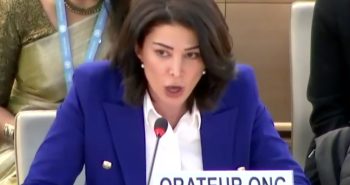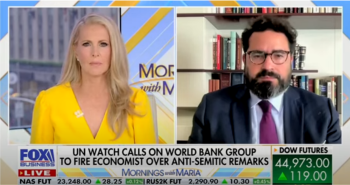The Commission on Human Rights wrapped up its 54th session in Geneva.
Analysis: After years of political wrangling, the Commission finally reformed its agenda. Adopting a new agenda is the Commission’s way of signaling how it views human rights throughout the world. This could have been an excellent opportunity to address many of the criticisms of the Commission’s work, but sadly, glaring inequities persist in the new agenda. Once again, Israel will be the sole country in the world whose human rights record will occupy an entire agenda item, and her alleged human rights abuses will continue to be treated as foregone conclusions.
So what has the Commission become? Israel is prejudged; the Commission on Human Rights votes to reject censure of Cuba’s poor human rights record; China escapes any consideration of its human rights practices; and it took 13 years to adopt a declaration on human rights defenders which has absolutely no effect in the real world. This year’s Commission, like previous ones, failed to demonstrate fairness, justice, or any impartial search for truth. With human rights violations occurring worldwide, the Commission on Human Rights is not a resource that should be squandered.
* The U.S. Congress has finally approved payment of UN debts, but attached is an anti-abortion clause the White House has promised to veto.
Analysis: The bill that would pay nearly $1 billion in UN arrears includes an anti-abortion provision designed to prevent the funds from being used to provide any support for international family-planning organizations that advocate abortion rights. Congress has fused two unrelated issues – a foreign relations bill and a domestic abortion fight – and in the process guaranteed a presidential veto and ended all hopes for U.S. payment of UN debts this year. The Congress’ and White House’s inability to compromise will create fallout for both the UN and the U.S.
The UN will continue its work with or without the U.S. But in the absence of U.S. dues, the effectiveness of the World Organization will be impaired due to serious budgetary shortfalls. At the same time, the U.S. loses because its international influence will decline; its credibility inside UN fora will be undermined; and if the past dues are not paid this year, the U.S. could lose its vote in the UN’s General Assembly. The UN cannot be ignored as an institution with a global presence and which offers an important multilateral environment. The President and members of Congress should analyze the benefits they can derive from credible participation in UN fora, and balance those against impulses to engage in partisan domestic politics.





